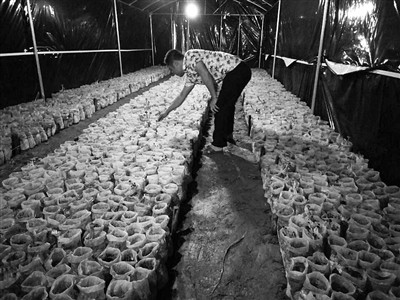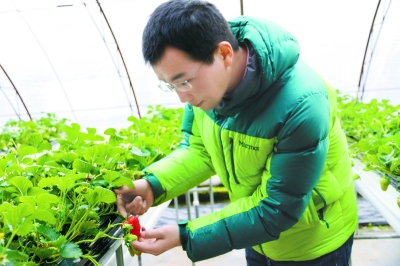There is "gold" under the rubber forest of planting pink bananas and raising bacteria.

This year, every day with the villagers, has been accustomed to, some reluctant to give up, although my task has been completed, but the villagers' road to wealth has just begun. -- Xie Xuefang
The continuous drizzle beat the banana leaves, Rain Water moistened the soil of the field, and Xie Xuefang, deputy mayor of Wupo Town, Tunchang, squatted in the rubber forest to observe the growth of pink bananas.
Xie Xuefang, a researcher from the Rubber Research Institute of the Chinese Academy of Tropical Agricultural Sciences, came to Wupo Town on December 29, 2015 to serve as deputy mayor for a term of one year. During this year, Xie Xuefang successively carried out projects of planting pink bananas under rubber forests and tea tree mushrooms under rubber forests, enabling more than 200 farmers to get rid of poverty and become rich.
He used to be a teacher and became a monk halfway through scientific research.
I first met Xie Xuefang in the Wupo town government. Xie Xuefang's first impression to the reporter was not like a researcher or a deputy mayor, but more like a farmer, revealing honesty and simplicity in his every move.
According to the provincial party committee and provincial government's "Action Plan for intellectual support of Western cities and Counties," Xie Xuefang and 48 other selected comrades were selected to serve as vice mayors of science and technology townships for a term of one year. On December 29, 2015, Xie Xuefang reported to the government of Wupo Town to be in charge of earthquake, science and technology, as well as agriculture.
During the interview, the reporter learned that Xie Xuefang is a "halfway monk" researcher.
Xie Xuefang told reporters that he was a former teacher. At the age of 38, he was successfully admitted to graduate school through self-study of ecology, and has since embarked on the road of scientific research.
Although he is a scientific researcher, Xie Xuefang's main work is the promotion of scientific research achievements, and he does not have much contact with the grass-roots level, so when he first took up his post, he was a little "confused." "I didn't know anything about the grass-roots environment, and I didn't know where to start. At that time, the leaders of the town took me down every day, and I became familiar with it for a long time." Xie Xuefang said.
Planting pink bananas under rubber forest will increase the income by 2,000 to 3,000 yuan per mu.
Because he was engaged in agriculture, Xie Xuefang first thought of starting from agriculture.
After a visit, Xie Xuefang learned that the agricultural cash crops in Wupo Town are mainly rubber and betel nut, and he happens to have some research on the "economy under the rubber forest", which allows him to find a direction at once. "the economy under the rubber forest is not a new planting model, but it has not developed in Wupo town."
Xie Xuefang thought of planting pink bananas under the rubber forest, "because pink bananas are very good, the technical difficulty is small, and there are three purchase points in the town, so there is no shortage of sales, and the price is relatively high." Xie Xuefang told Wang Zonghan, director of the joint venture farm in Wupo town, that Wang Zonghan was very supportive and immediately decided to set aside 15 mu of land as a demonstration area.
"come on, let's go to the farm and have a look." Under the leadership of Wang Zonghan, the reporter and his party came to the pink banana demonstration area of the joint venture farm in Wupo town. "Yo, they have all grown so tall, I didn't expect it." Wang Zonghan said that he was a little surprised by the gratifying growth of Fan Jiao.
Many pink plantain trees were planted in the rubber forest, each about one person tall. Xie Xuefang went into the field and carefully examined the growth of pink bananas. "Yes, they all grow very well." Xie Xuefang said that these pink bananas were planted in June this year and will be picked in July and August next year.
After confirming the project of planting pink plantains under the rubber forest, Xie Xuefang applied for 7000 seedlings, sent them to the village committees of each village, and provided fertilizer and other supporting facilities free of charge. Because it was distributed free of charge, 7000 seedlings were quickly robbed, so Xie Xuefang applied for another 6000 seedlings and was snapped up again. "I didn't plan to send the second batch, but I didn't expect the enthusiasm of the villagers to be so high." Xie Xuefang said.
Lin Fangqiong in Nilin Village, Wupo Town, is one of the "activists" to take care of the seedlings. He has got a total of 2000 seedlings, with a planting area of 20 mu. "because it is free, and with Deputy Mayor Xie as the gatekeeper, we have nothing to worry about." He said.
At present, Wushi Town has more than 200 villagers participating in the pink banana project under the rubber forest, with a planting area of more than 130 mu. "the pink banana we promoted is an excellent variety with high yield. In the past, the pink banana planted locally could produce up to 20 jin, but now the average yield is 50 jin. In this way, excluding the management cost per mu, the net income can be increased by more than 2000-3000 yuan." Xie Xuefang said.
The income of growing mushrooms under the rubber forest for more than ten days is ten thousand yuan.
Xie Xuefang told the reporter that planting powdered bananas is only suitable for rubber forests less than five years old. when rubber trees grow up, their branches and leaves will block the sun and affect the growth of pink plantains, which is doomed to the limitations of planting pink plantains. How to develop the "underforest economy" in rubber forests with relatively large rubber trees?
Xie Xuefang learned that a company in Wupo Town had previously planted Dictyophora under rubber trees, and this company also happened to have experience in growing tea tree mushrooms. Tea tree mushrooms like shade, so they happen to be suitable for growing under large rubber trees, so the project of tea tree mushrooms under rubber trees appeared in Xie Xuefang's mind.
After Xie Xuefang reported the project, he immediately received the support of the Tunchang County Agricultural Bureau, which allocated 300000 of the funds. Xie Xuefang set up a demonstration zone for planting tea mushrooms in the rubber forest of the above-mentioned companies, and at the same time promoted it to cooperatives in two villages, and found a way for enterprises to lead farmers' professional cooperatives to grow tea mushrooms under rubber trees.
Wang Xiaoming, director of Dahu Village of Qingti Village Committee in Wupo Town, joined several villagers to set up Jinming Agricultural planting and raising Professional Cooperative in 2014. He himself became the first promoter of the project to grow tea tree mushrooms under the forest.
Wang Xiaoming told the reporter that when he first set up a cooperative, he first engaged in growing bamboo trees under the forest, but he did not make any money. "later, Deputy Mayor Xie came to me about the project of planting tea tree mushrooms under the forest, and I thought it was OK, so I agreed." He said.
In the rubber forest next to Wang Xiaoming's house, there are five greenhouses, all of which are tea mushrooms, some of which have already grown up and some have just emerged. "these outcrops grow again after picking." Wang Xiaoming told the reporter that about 10 days ago, the first batch of tea mushrooms began to be picked. Because tea mushrooms grow rapidly and grow back the day after picking, there are fresh tea mushrooms almost every day.
"because the market is not open now, only three greenhouses have been adopted. On average, they can pick about 200 jin a day and sell them in the town. Now they have sold it for about 10000 yuan in more than 10 days." Wang Xiaoming said that he was too busy by himself, and he also hired eight or nine poor families in the village to help, which not only reduced his own pressure, but also led the poor families in the village out of poverty.
Invite experts to train
"teach fishing" to the villagers
From the first day he took up his post, Xie Xuefang adhered to the principle of "science and technology serving agriculture, rural areas and farmers" and helped the poor through science and technology. But it's easier said than done.
Xie Xuefang told the reporter that when the plantain planting was just started, many villagers did not know how to plant it and lost a lot of seedlings. "later, I applied for 1000 replanted seedlings. While watching them plant in the field, I told them how to plant them."
In addition, Xie Xuefang also organized scientific and technological training in various village committees. Organize five scientific and technological training sessions, train farmers for more than 300 times, and organize the person in charge of the Wupo town cooperative to participate in the series of "patent doubling" training carried out by the Provincial Science and Technology Department in Tunchang. Give full play to the role of the bridge between the duty site and the original unit, invited experts from the Rubber Institute of the Chinese Academy of Tropical Agricultural Sciences for five times to carry out technical guidance on rubber planting management.
On December 30 this year, Xie Xuefang will be in office for one year, and he will leave Wupo town and return to his original unit. Speaking of parting, Xie Xuefang said, "this year, I have been used to being with the villagers every day, and I am somewhat reluctant to give up. Although my task has been completed, the road for the villagers to get rich has only just begun." He said.
Related
- A course of planting techniques and methods on how to grow carrots
- How to plant the latest tulips?
- Is it better to pick tea in the morning or in the afternoon? When is the best time for tea to be picked? what is the third or fifth tea?
- Launch Yuanxiao Happy combination Haocha + Tea Yuan healthy Taste
- Penghu Tourism "Fireworks 20 Parade with You"
- 2022 West Lake Happiness holds "Digital Revitalization Voucher" and draws iphone13 and laptop.
- Banqiao Fuzhou social houses are designed to change start-up combined with police elimination to create a safe and livable environment
- The convenient measure of "mechanical weeding" in Xinbei has been abused and the Agriculture Bureau has imposed heavy penalties on the illegal land consolidation.
- Changgeng University Joins Hands with Four Memory Factories to Rescue Memory Talent Shortage
- The list of Taiwan's top 100 MVP managers is listed by the Director-General of the Farmers' Association of Sanxia District.



